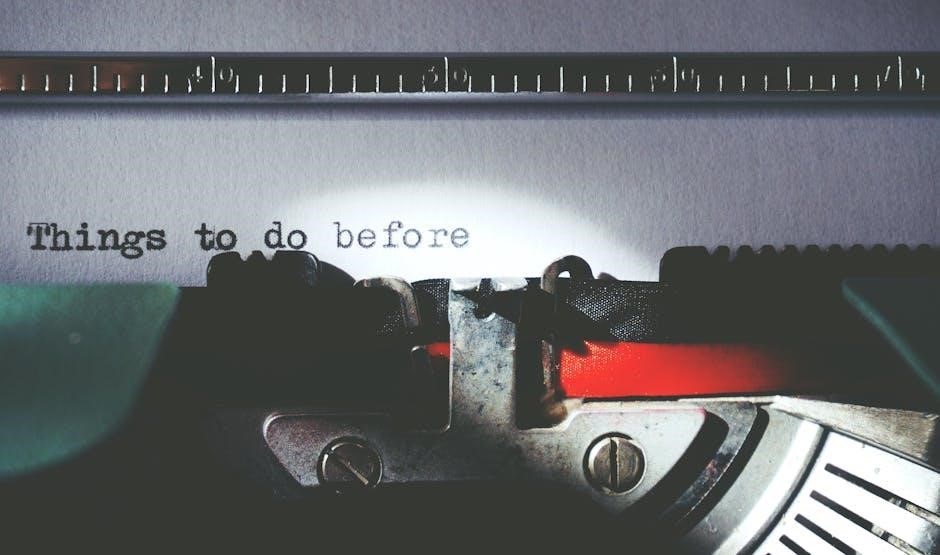
Do Hard Things PDF: A Comprehensive Guide
This guide explores the essence of “Do Hard Things‚” examining various perspectives․ It delves into Alex and Brett Harris’s teenage empowerment message and Steve Magness’s science-backed approach to toughness․ Discover actionable strategies and resources‚ including PDF availability‚ to embrace this transformative philosophy․
“Do Hard Things” is more than just a motivational phrase; it’s a philosophy explored in different contexts by various authors․ This comprehensive guide delves into the core concepts presented in two prominent works sharing this title․ First‚ we examine Alex and Brett Harris’s “Do Hard Things: A Teenage Rebellion Against Low Expectations‚” a Christian-based book encouraging teens to transcend societal limitations and embrace challenges․
Subsequently‚ we explore Steve Magness’s “Do Hard Things: Why We Get Resilience Wrong and the Surprising Science of Real Toughness‚” which challenges conventional notions of mental toughness․ Magness blends mindfulness‚ sports psychology‚ and neuroscience to redefine resilience․ This guide aims to provide a thorough understanding of both perspectives‚ examining key concepts‚ actionable strategies‚ criticisms‚ and resources‚ including potential PDF availability․ Whether seeking teenage empowerment or a scientifically grounded approach to toughness‚ “Do Hard Things” offers valuable insights․
“Do Hard Things” by Alex and Brett Harris: Teenage Rebellion
Alex and Brett Harris’s “Do Hard Things: A Teenage Rebellion Against Low Expectations” challenges the modern perception of adolescence as a period of carefree irresponsibility․ Published in 2008‚ this book encourages teenagers to reject the notion of lowered expectations and instead strive for meaningful accomplishments․ The Harris twins argue that historically‚ the transition from childhood to adulthood was more clearly defined‚ urging teens to embrace maturity and responsibility․

Through personal anecdotes and biblical principles‚ the book inspires teenagers to step outside their comfort zones and pursue challenging endeavors․ It promotes the idea that young people are capable of making a significant impact on the world‚ advocating for a proactive and purposeful approach to life․ “Do Hard Things” resonated with a Christian audience‚ becoming a bestseller and sparking a movement of “rebelutionaries” who actively challenge societal norms and embrace a higher calling․ The book’s message emphasizes potential‚ encouraging teens to exceed expectations․

Key Concepts from “Do Hard Things: A Teenage Rebellion Against Low Expectations”
Central to Alex and Brett Harris’s book is the rejection of the “myth of adolescence‚” challenging the societal expectation of teenagers as incapable or irresponsible․ Instead‚ the book champions the idea that young people are capable of doing hard things and making a meaningful impact․
The core message revolves around embracing challenges and pushing beyond one’s comfort zone․ The Harris brothers encourage teens to actively seek out opportunities for growth‚ whether through academics‚ service‚ or personal development․ The book promotes a proactive approach to life‚ urging readers to take ownership of their choices and pursue excellence in all endeavors․ “Do Hard Things” emphasizes the importance of breaking free from mediocrity and societal pressures‚ advocating for a life of purpose and intentionality․ This involves challenging the status quo and refusing to settle for a life of low expectations․
“Do Hard Things” by Steve Magness: Redefining Toughness
Steve Magness’s “Do Hard Things: Why We Get Resilience Wrong and the Surprising Science of Real Toughness” offers a contrasting perspective‚ rooted in scientific research․ He challenges traditional notions of toughness that often involve suppressing emotions or pushing through pain without awareness․
Magness argues that true toughness lies in navigating discomfort‚ developing emotional intelligence‚ and understanding one’s internal signals (interoception)․ His approach emphasizes the importance of mindfulness‚ self-awareness‚ and making thoughtful decisions in the face of challenges․ It’s about leaning into discomfort‚ paying attention to the body and mind‚ and creating space for reasoned action․ The book encourages a more nuanced and sustainable approach to resilience‚ focusing on long-term well-being and performance rather than short-term gains achieved through sheer willpower․ Magness highlights that being genuinely tough involves embracing vulnerability and learning from difficult experiences․
Challenging Traditional Views of Toughness
Traditional views of toughness often equate it with suppressing emotions‚ ignoring pain‚ and relentlessly pushing forward‚ regardless of the consequences․ This perspective emphasizes a “no pain‚ no gain” mentality‚ where vulnerability is seen as weakness and resilience is defined by an unwavering ability to withstand hardship․ Such an approach can lead to burnout‚ injury‚ and a disconnection from one’s physical and emotional needs․
Steve Magness‚ in “Do Hard Things‚” challenges these conventional ideas‚ arguing that they are not only ineffective but also harmful․ He suggests that true toughness involves a deeper understanding of oneself‚ including one’s limits and emotional responses․ It’s about developing the capacity to navigate discomfort intelligently‚ making informed decisions‚ and embracing vulnerability as a source of strength․ This reimagined view emphasizes self-awareness‚ emotional regulation‚ and a willingness to learn from challenging experiences‚ ultimately fostering a more sustainable and holistic approach to resilience․
The Four Pillars of Real Toughness (If Specified in Detail)
While the specific “four pillars” might not be explicitly detailed in all summaries‚ Steve Magness’s “Do Hard Things” builds real toughness on key principles․ First‚ embrace discomfort: true growth lies beyond your comfort zone‚ so lean into challenges instead of avoiding them․ Second‚ cultivate self-awareness: understand your emotional and physical responses to stress‚ allowing for informed decisions․ Third‚ develop emotional regulation: learn to manage your emotions effectively‚ preventing them from dictating your actions during difficult times․
Finally‚ foster thoughtful action: create space for reflection and make conscious choices aligned with your values and goals․ These pillars promote a holistic understanding of toughness‚ emphasizing the importance of emotional intelligence‚ self-compassion‚ and strategic decision-making․ This approach moves beyond the outdated notion of simply “powering through‚” offering a more sustainable and effective path to resilience․
The Significance of Interoception (If Detailed Information Available)
If “Do Hard Things” by Steve Magness details interoception‚ it likely emphasizes its crucial role in redefining toughness․ Interoception‚ the ability to perceive internal bodily signals like heart rate‚ breathing‚ and muscle tension‚ becomes a foundation for navigating discomfort․ Instead of ignoring or suppressing these signals‚ Magness likely advocates for tuning into them․
By understanding these internal cues‚ individuals can differentiate between helpful and harmful stress responses․ For example‚ recognizing increased heart rate due to excitement versus anxiety allows for more appropriate action․ This awareness prevents pushing past genuine limits‚ promoting sustainable performance․ Interoception helps individuals make informed decisions about when to push harder and when to rest‚ ultimately fostering a more resilient and adaptable approach to challenges․ The book may frame interoception as a vital skill for cultivating true mental and physical toughness․
Actionable Strategies from “Do Hard Things”
If “Do Hard Things” by Steve Magness offers actionable strategies‚ they likely revolve around embracing discomfort and developing emotional intelligence․ One strategy might involve intentionally exposing oneself to manageable discomfort‚ gradually increasing tolerance․ This could involve pushing physical limits during exercise or engaging in challenging mental tasks․
Another strategy could focus on cultivating interoceptive awareness through mindfulness practices‚ such as meditation or body scans․ Learning to identify and interpret internal bodily signals allows for more informed decision-making under pressure․ Furthermore‚ the book may suggest reframing challenges as opportunities for growth rather than threats․ This involves shifting perspective to view setbacks as learning experiences and embracing vulnerability․ Implementing these strategies requires consistent effort and self-reflection‚ but they can lead to increased resilience and the ability to navigate difficult situations effectively․ The book may also advocate for seeking support from others․
Comparing “Do Hard Things” by Harris and Magness
Comparing “Do Hard Things: A Teenage Rebellion Against Low Expectations” by Alex and Brett Harris with “Do Hard Things: Why We Get Resilience Wrong and the Surprising Science of Real Toughness” by Steve Magness reveals distinct approaches․ The Harris brothers’ book‚ rooted in Christian values‚ challenges teenagers to defy societal norms and pursue ambitious goals‚ emphasizing self-discipline and faith․ It promotes a proactive stance against mediocrity;

In contrast‚ Magness’s book dissects the science of toughness‚ advocating for emotional intelligence and mindful awareness of internal states․ It critiques traditional notions of toughness‚ suggesting that suppressing emotions is counterproductive․ While both books encourage pushing boundaries‚ their foundations differ significantly․ Harris focuses on spiritual and moral development‚ while Magness emphasizes psychological and physiological understanding․ One speaks to faith-driven action; the other to evidence-based resilience․ Despite differing perspectives‚ both aim to empower individuals to overcome challenges‚ albeit through contrasting methodologies․

Criticism and Reception of “Do Hard Things”
“Do Hard Things” by Alex and Brett Harris garnered considerable attention‚ sparking both praise and criticism․ Supporters lauded its call for teenage empowerment‚ applauding its challenge to societal expectations and encouragement of ambition․ Many found its message inspiring‚ particularly within Christian communities․ However‚ some critics argued that the book’s prescriptive approach could be overly demanding‚ potentially fostering unrealistic expectations and guilt among teenagers․
Steve Magness’s “Do Hard Things” has been similarly debated․ While many appreciate its evidence-based approach to resilience‚ some find its scientific jargon dense and less accessible․ Others question the universal applicability of its strategies‚ suggesting that individual differences and contextual factors may influence effectiveness․ Overall‚ both books have stimulated important conversations about personal growth and resilience‚ though their reception varies based on individual values and perspectives․ The Harris’ work faces scrutiny regarding its potential for creating pressure‚ whereas Magness’s book is sometimes criticized for its complexity․
“Do Hard Things” PDF Resources and Availability
Finding a legitimate free PDF of “Do Hard Things” by either Alex and Brett Harris or Steve Magness can be challenging‚ as publishers often protect copyrighted material․ However‚ several avenues might offer access to excerpts‚ summaries‚ or related resources in PDF format․ Websites like Blinkist provide condensed summaries of books‚ including “Do Hard Things” by Steve Magness‚ often available as PDFs for subscribers․
Academic databases and online libraries may also contain excerpts or analyses of the books in PDF form․ Additionally‚ authors or publishers sometimes offer promotional materials or sample chapters as free downloads on their websites․ Be cautious of unofficial sources offering full PDFs‚ as these may be illegal or contain malware․ Consider exploring reputable online bookstores or libraries for affordable digital versions or borrowing options․ Remember to respect copyright laws and support authors by purchasing legitimate copies whenever possible․ Legal and safe access is always the best approach․
Embracing the “Do Hard Things” Philosophy
The “Do Hard Things” philosophy‚ whether interpreted through the lens of teenage rebellion against low expectations or the science-backed approach to real toughness‚ offers a powerful framework for personal growth․ Both perspectives encourage individuals to step outside their comfort zones‚ challenge conventional wisdom‚ and cultivate resilience in the face of adversity․ Embracing this philosophy means actively seeking opportunities for growth‚ even when they are difficult or uncomfortable․
It involves redefining our understanding of toughness‚ moving away from suppressing emotions and embracing discomfort as a catalyst for development․ By integrating the key concepts‚ actionable strategies‚ and critical insights gleaned from both the Harris brothers’ and Steve Magness’s works‚ we can equip ourselves with the tools necessary to navigate life’s challenges and achieve our full potential․ Ultimately‚ the “Do Hard Things” philosophy is a call to action‚ urging us to live more intentionally‚ pursue meaningful goals‚ and become the best versions of ourselves․